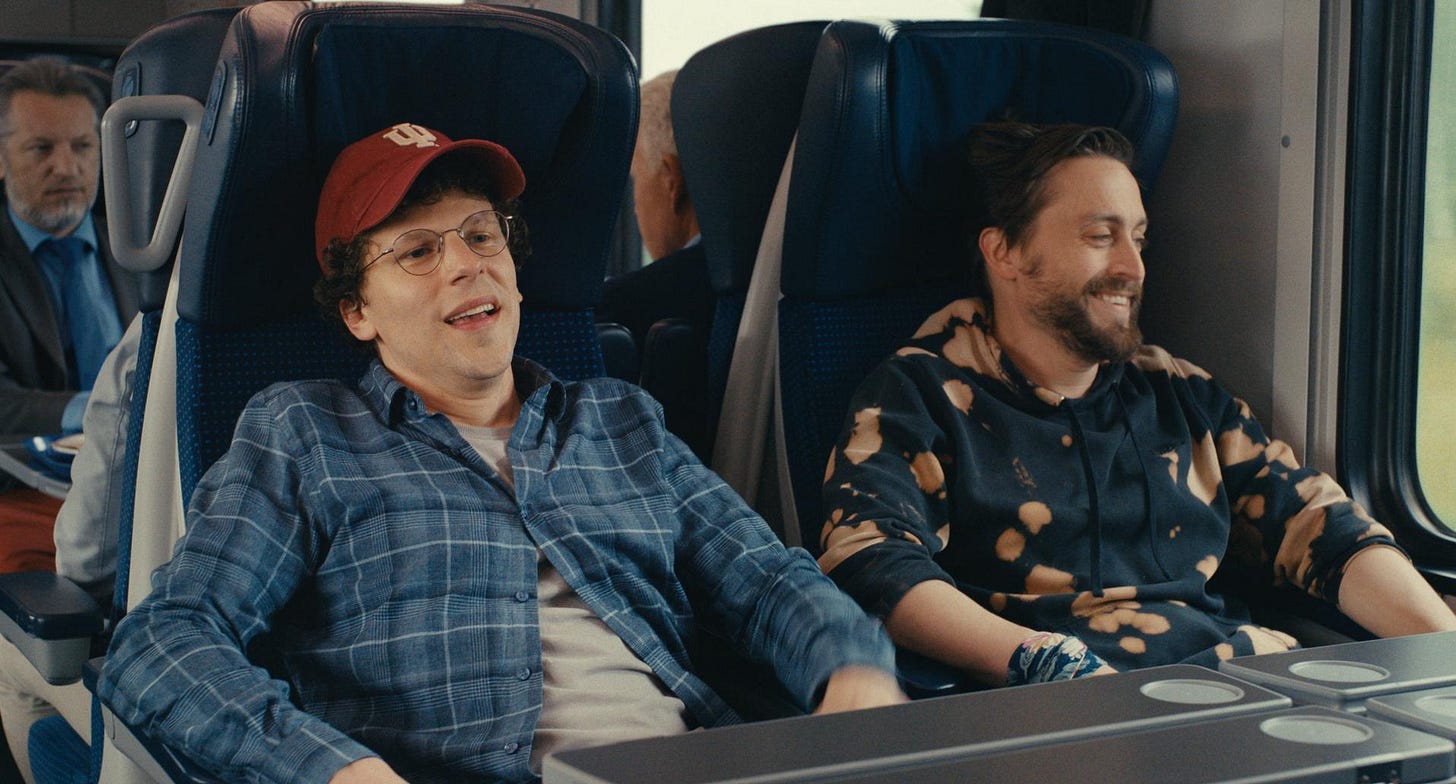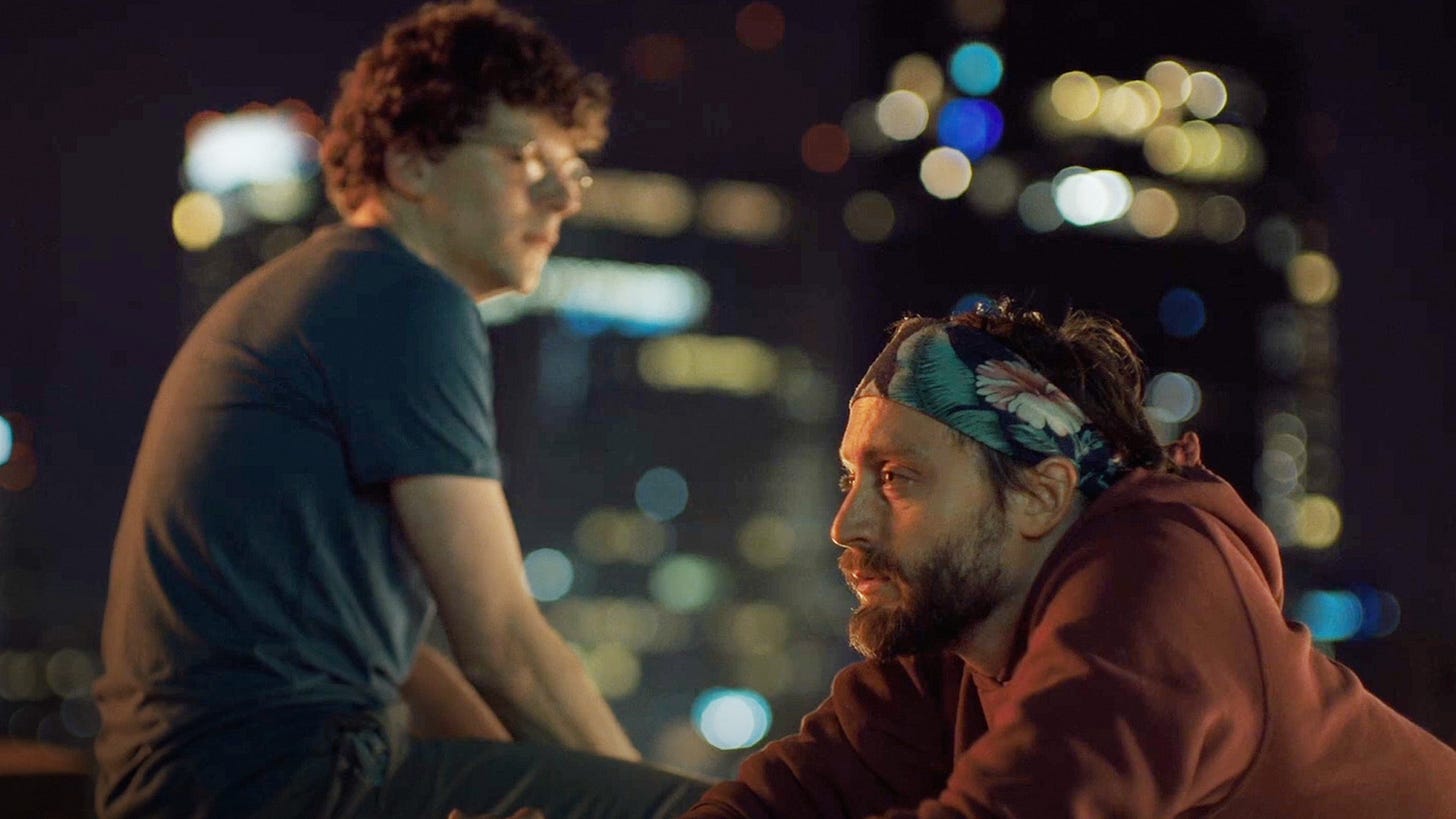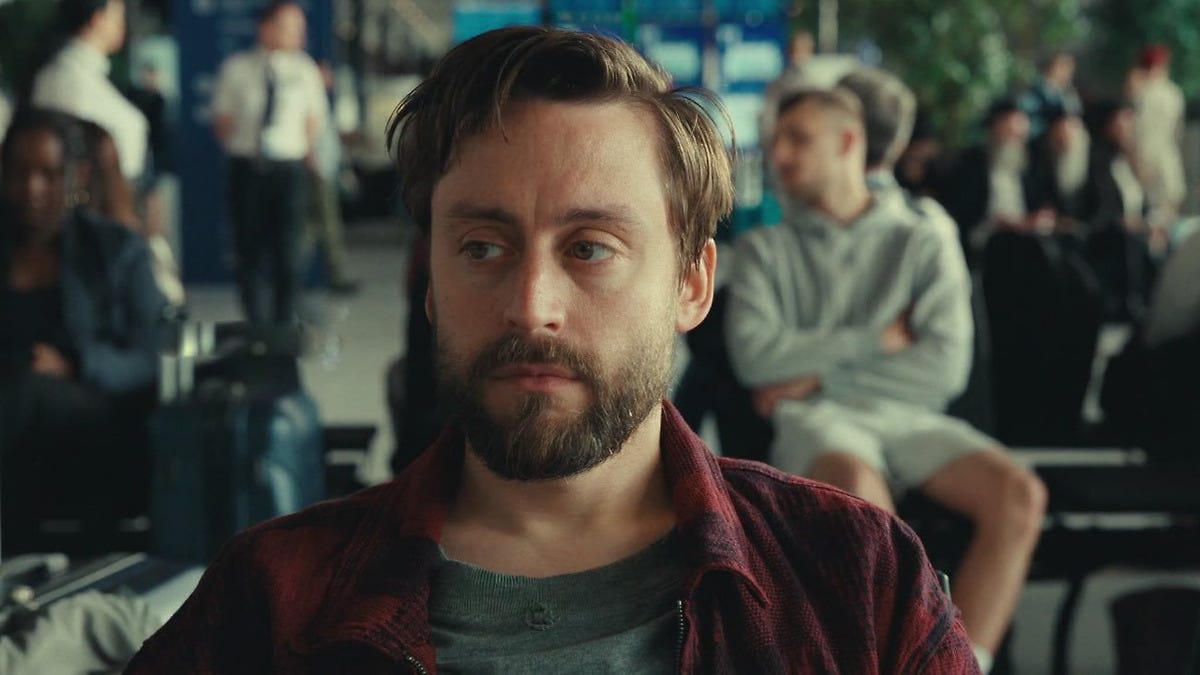'A Real Pain's Small but Mighty Note on Capitalism
There's a pattern it wants you to recognize
“Small but mighty” is a pretty apt descriptor for A Real Pain as a whole. Armed with just a $3 million production budget, a tightly written and even more tightly executed screenplay, and Home Alone breakout Kieran Culkin, Jesse Eisenberg’s sophomore flick has soared among 2024’s most respected films.
But you know that already — you don’t need another gratuitous commercial anecdote about A Real Pain. You know this movie, you’ve probably seen this movie since you’re reading this, and that in turn is likely driven by a desire to engage with this film from a new angle.
To that point, I firmly believe that the best film criticism lies in a three-way engagement between the film, the critic, and the reader. The film expresses, the critic translates, and the reader sounds back with questions and readings of their own. It’s communal, conversational, non-hierarchical.
Anti-capitalist.
Anyway, the eponymous note in question occurs during Benji’s and David’s attempt to reunite with their tour group after missing their train stop (the photo above being one of the scene’s final shots). Benji hatches a plan to sneak onto the train without buying tickets, and then avoiding the ticket attendant until they make it to Lublin. This, much to the apprehension of the skittish David.
Importantly, they can afford the tickets, but Benji insists on doing this out of principle — he harbours a great disdain for paying for things that he believes should be free. He makes a great point. Is it not ideal for a country to invest in its citizens and subsequently enable them to give back to the world? Domestic transit, education, childcare, medical care; free access to these things is necessary for building a truly healthy and involved society, and I think that to be a decidedly uncontroversial take.
Capitalism, as it has manifested,1 is not interested in this — capitalism wants you to prove that you’re worthy of the things that we all need just to survive in, move through, and give back to the world, in that order.
If you can somehow prove that, it then puts you in a cubicle so that you can instead give back to a corporation that is, in all likelihood, actively taking from the world. This, in exchange for more money, which you use to keep paying for the things you need to survive. Survive, so that you can go to work. Rinse and repeat.
Antonio Melonio wrote a fantastic essay on what he calls “useless work” that speaks to the realities of this system better than I ever could. It’s as vital a read as it is harrowing.
Back to A Real Pain, though. The success of Benji’s scheme coupled with David’s insistence that they buy tickets raises an important insight. If Benji relented to David’s fears and the two of them bought tickets, what would they actually be paying for? It wasn’t the seats because they ultimately wound up sitting in first class, and it wasn’t the journey itself because they made it to Lublin regardless. They got those things without paying, so what purpose would the tickets actually serve?
Well, had they bought tickets, they would have been buying peace of mind.
David may not have realized this, but he was never worried about not making it to Lublin; he was worried about getting caught without a ticket. That ticket, then, doesn’t ensure the trip — it just ensures that you don’t get apprehended by a system that demands proof of your compliance with it.2 If you comply, you don’t get apprehended, hence peace of mind.
I noticed this in my own life recently. I flew to California a few weeks ago, and those of you familiar with flying know that you have the option to purchase a seat after you book your flight. You don’t need to buy a seat; you just won’t have much of a say over where you sit on the plane, and there’s also a chance you could get bumped if the flight becomes overbooked.
Paying for seats — especially if there’s one or more connecting flights — can get pricy, so I told myself I wouldn’t buy them unless the flights started filling up. This, of course, unleashed my inner David — I began obsessively checking the seat map every day to see if I would still safely be guaranteed a spot on the plane.
In other words, my peace of mind was non-existent.
I eventually just bought the seats, meaning I purchased peace of mind that I would be able to travel without getting indirectly punished by a system that prioritizes those who have purchased seats on the plane.
Back again to A Real Pain, we can flesh out this capitalism-contextualized peace of mind maxim by also contextualizing it in Benji’s and David’s differing attitudes on social etiquette. To do that, we must first examine the way their mental illnesses manifest.
Benji clearly deals with something adjacent to bipolar disorder, and he ostensibly refuses to medicate.3 In other words, peace of mind isn’t well and truly on the table for him.
David, meanwhile, deals with an anxiety disorder, but the film makes a point to show that he does take medication for it. Like the train tickets they never bought, this medication is David’s way of paying for peace of mind. Importantly, however, David still seems no less tortured than Benji. More on this in a minute.
And so the question is, whose peace of mind are those meds actually for? Are they for David, or are they for the people around him?
There’s a heavy argument for the latter. David constantly worries about taking up too much space and bothering others — he will shrink for the sake of not disrupting the energy of anyone else. His meds help him do this.4
Benji, meanwhile, makes a point to allow his undiluted, unmedicated, messy humanity to leave an impact on the space he occupies and the people around him. That impact draws a lot of attention, not all of it good, but it always serves to highlight Benji’s refusal to wear a mask so as to be more digestible to the world around him. Refusal to give up autonomy for the sake of acceptance. To give up authenticity for the sake of attachment.
And, perhaps, refusal to medicate for the sake of making his behaviour more socially acceptable.
Now let’s compare the pair’s differing attitudes on social etiquette, to their differing attitudes on the economic system. In doing so, it becomes apparent that the economic system and social settings are inseparable from each other, and the common denominator is peace of mind.
Moreover, we can understand peace of mind as not just something we buy or seek, but also offer to others. Just as we can read David’s medications as peace of mind for the people around him rather than him himself, could we not also read the train tickets as peace of mind for the capitalist system rather than David and Benji?
Indeed, while David muses on the ethics of suppressing one’s trauma and pain to keep everyone else comfortable, A Real Pain similarly asks us how much dignity we’re willing to swallow to keep the system satisfied.
In buying a train ticket, you become digestible to the system. In masking your true feelings, you become digestible in social settings.
If too many people refuse to be digestible, the system and/or social setting will be forced to adapt, or risk choking.
Benji has no interest in satisfying the system, and therefore swallows no dignity. He gets on the train without a ticket and gets where he needs to go — he brings his own rules to the system and plays by them instead. The way he interacts with humans is no different.
David, meanwhile, is intimidated by a ticket attendant, an exit door in a hotel, and other systemic parameters that he only ever defies when following in Benji’s footsteps. He swallows a lot of dignity so as to not ruffle any of the feathers that Benji ruffles just by cruising. This is true of the system, this is true of other people.
Peace of mind, then, emerges as the thing that David chases in both social interactions and this capitalist system. He medicates for peace of mind, he suggests not going onto the hotel roof for peace of mind, he really wants to buy tickets for his peace of mind, and he’s constantly apologizing for the sake of his peace of mind.
Whether it’s knowing that he’s not offending anyone or breaking any rules — and therefore offering peace of mind to other people or the system — David’s own peace of mind is his North Star.
But it’s all for naught. David’s peace of mind is ultimately nullified by him tormenting himself with his resulting, internalized insignificance, brought on in no small part by how unfavourably he compares himself to the free-spirited Benji, whose North Star is authenticity.
What do we learn from this? That peace of mind isn’t actually achievable as a constant — that the desire to achieve and maintain peace of mind requires a preemptive instability, and so it can therefore only be sold to us if we’re coming from a place of fear or anxiety.
This is what capitalism preys upon — our brains are wired to find problems and then solve them, and capitalism has convinced us that we can buy or bargain our way out of our problems or anxieties instead of facing them, feeling them, connecting with them, or otherwise meeting/treating them with authenticity.5
David falls for this, Benji does not. David spends the whole movie bargaining for peace of mind (economically and socially), and he never ends up any closer to it than Benji, who may be a tortured soul in his own right, but at least he ultimately has his true colors to show for his plight.
A Real Pain. A Fake Peace of Mind.
Peace of mind is a folly; a false product and promise offered by a system that is actually taking us as emotional hostages. Benji is aware of this, and he has therefore decided that active authenticity — pure, unadulterated feeling and experiencing and connecting — is the best way to live life.
And it just so happens this attitude towards life — to bring it full circle again — is the antithesis of existing in a capitalist system.
Is it any wonder that Benji seemingly refuses to get a job? When you’re as dialed into your humanity as he is, the apathy of the capitalist system — and, more accurately, the commitment to it — could single-handedly decimate one’s soul.
So what do the rest of us — including David — do to move through this system? We begrudgingly play by these dehumanizing rules, numbing ourselves to them and suppressing our feelings so that they don’t get in the way of our digestibility. Cut each other off from our true pain, as Benji would put it.
Of course, Benji’s confrontational nature towards society and the system has its limits, right? I mean, we can’t all suddenly just stop paying for train tickets, right? It’s not as simple as collectively refusing to play by capitalism’s rules, right? You can’t just dismantle something like that, right?
I don’t claim to know these answers. All I’m saying is that a longer cut of A Real Pain could have included direct or indirect references to the Berlin Wall, and it would have fit in perfectly.
When capitalism was originally conceived, it was foolishly assumed that trickle-down economics would, y’know, occur.
Compliance, in this case, meaning paying for a ticket on a train that’s moving anyway. Proof, meaning the ticket itself.
This is the part where I tell you all that, in this way, Benji is important to me.
This isn’t me shaming the use of medication, of course. In all likelihood, they’re primarily for David’s peace of mind, but I think it’s insincere to ignore the element of social suppression that they bring, especially in the context of A Real Pain, which has a direct interest in the theme of raw vulnerability and how acceptable it is to express that.
Buying/bargaining, after all, is much easier than allowing oneself to feel.









Dizzying and true. I need a rewatch.
Fromtheyardtothearthouse.substack.com
you get it. most people i've seen comment on a real pain seem to identify with david, but i relate so deeply to benji. this essay made me cry, because it made me feel understood in the same way the film did. beautifully written